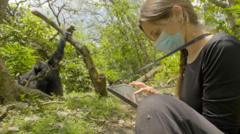In a groundbreaking study, recorded by the University of Oxford along with local teams, these chimpanzees have been filmed employing plants not only to address open wounds but also for overall health maintenance. Such practices mirror human-like self-care methods and contribute to a broader understanding of wild animal behavior.
As part of their extensive research, scientists compiled decades of observations from the Budongo Forest, calibrating a database of how chimpanzees conduct their self-medication rituals. Lead researcher Elodie Freymann highlighted an extensive behavioral repertoire among these primates, noting that they utilize plant parts by chewing them to apply on injuries or dabbing them directly onto wounds. This insightful study builds on previous findings indicating that primates, including chimps, orangutans, and gorillas, harness natural resources effectively for medicinal purposes.
One particularly noteworthy observation involved a young female chimpanzee helping her mother by applying chewed plant material to her mother's injury. Such acts not only denote an advanced level of care but also imply the presence of empathy amongst chimpanzees, further deepening the bond they share.
The catalog of behaviors compiled from field notes dating back to the 1990s includes vivid anecdotes of chimps tending to other primates' wounds, and even utilizing plants for personal hygiene. One entry described a chimp brushing itself with leaves after defecating—a feature that highlights their intelligence and social awareness.
Additionally, the researchers identified several plants that chimps typically consume when injured, and found that most possess antibacterial properties. Gaining insight into these unique animal behaviors can not only enhance our understanding of primate intelligence but could also provide valuable information for the development of new medicinal compounds through the study of these plants.
Freymann's reflections on the necessity of acquiring knowledge from nature underscore the wisdom that chimpanzees hold in navigating their ecosystem. She voiced that while humans could struggle to survive without resources, chimpanzees thrive due to an innate ability to exploit the natural world and its medicinal offerings for health and well-being.
As part of their extensive research, scientists compiled decades of observations from the Budongo Forest, calibrating a database of how chimpanzees conduct their self-medication rituals. Lead researcher Elodie Freymann highlighted an extensive behavioral repertoire among these primates, noting that they utilize plant parts by chewing them to apply on injuries or dabbing them directly onto wounds. This insightful study builds on previous findings indicating that primates, including chimps, orangutans, and gorillas, harness natural resources effectively for medicinal purposes.
One particularly noteworthy observation involved a young female chimpanzee helping her mother by applying chewed plant material to her mother's injury. Such acts not only denote an advanced level of care but also imply the presence of empathy amongst chimpanzees, further deepening the bond they share.
The catalog of behaviors compiled from field notes dating back to the 1990s includes vivid anecdotes of chimps tending to other primates' wounds, and even utilizing plants for personal hygiene. One entry described a chimp brushing itself with leaves after defecating—a feature that highlights their intelligence and social awareness.
Additionally, the researchers identified several plants that chimps typically consume when injured, and found that most possess antibacterial properties. Gaining insight into these unique animal behaviors can not only enhance our understanding of primate intelligence but could also provide valuable information for the development of new medicinal compounds through the study of these plants.
Freymann's reflections on the necessity of acquiring knowledge from nature underscore the wisdom that chimpanzees hold in navigating their ecosystem. She voiced that while humans could struggle to survive without resources, chimpanzees thrive due to an innate ability to exploit the natural world and its medicinal offerings for health and well-being.



















